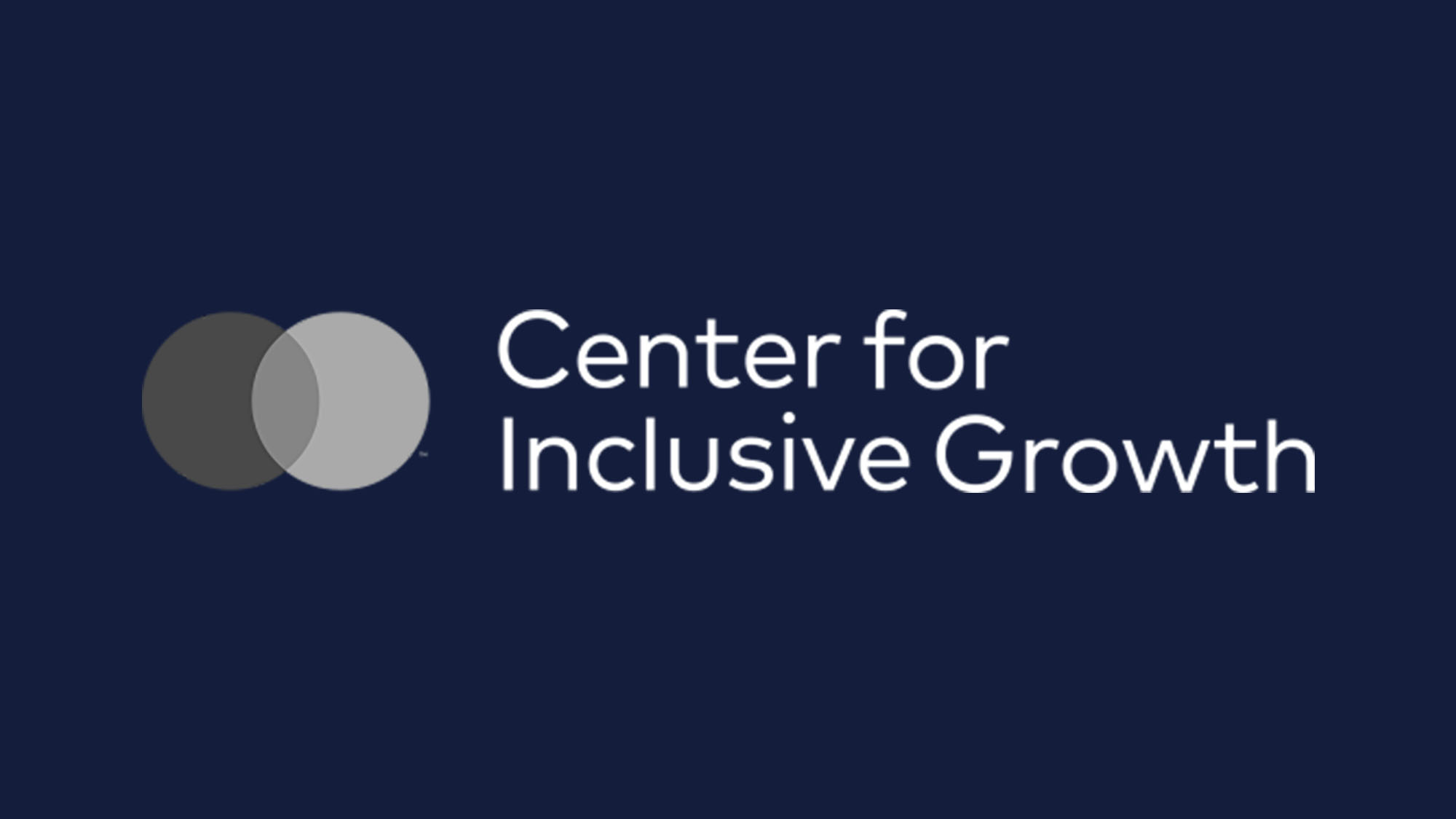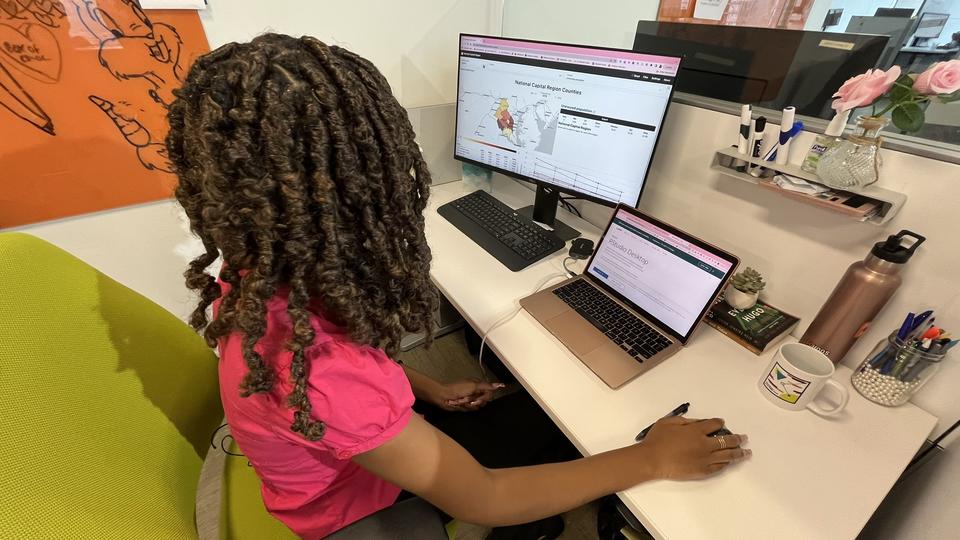The Social Impact Data Commons is an innovative approach to inform equitable growth.
The objective of the project is to design, build, and deploy a regional Social Impact Data Commons capable of providing data, indicators, case studies, and training to allow local governments and community stakeholders in the Washington, D.C. metropolitan area to continuously learn from their own data. The Social Impact Data Commons will facilitate the analysis of both "business as usual" scenarios (e.g., tracking changes in the amount and type of affordable housing) and specific impact events (e.g., the introduction of a major employer like Amazon). The outcomes of these analyses will arm regional decision-makers with evidence to inform policies that will shape the quality of life for everyone.
Guided by the Biocomplexity Institute’s Community Learning Through Data-Driven Discovery (CLD3) process, the project team will identify and implement social impact topics to be implemented in the Data Commons. The number of social impact topics and data sources will continue to be added to the Data Commons as we expand to each new area in the Washington, D.C. metropolitan region.

This project will occur in three phases, with each phase expanding the Social Impact Data Commons across the Washington D.C. metropolitan region.
- Q1-Q2 – Ground design and initial deployment on Arlington County focusing on select issues of interest.
- Q3-Q4 – Expand geographic coverage to Fairfax County.
- Q5-Q8 – Expand to entire Washington, D.C. metro region
An Advisory Panel has been formed and will help guide the development of the Social Impact Data Commons as well as plan for future sustainability. Learn more about our Advisory Panel by clicking the Advisory Panel tab above.
 Siri Russell, Associate Dean of Diversity, Equity and Inclusion, School of Data Science
Siri Russell, Associate Dean of Diversity, Equity and Inclusion, School of Data Science
 Marc Ruggiano, Professor, School of Data Science and Darden School of Business
Marc Ruggiano, Professor, School of Data Science and Darden School of Business
 Michael Salgueiro, Research Programs Manager, Equity Center
Michael Salgueiro, Research Programs Manager, Equity Center
 Barbara Wilson, Co-founder and Faculty Director, Equity Center
Barbara Wilson, Co-founder and Faculty Director, Equity CenterAdvisory Panel Members
 Stephanie Shipp, Mastercard Advisory Panel Lead, Acting Division Director and Research Professor, Social and Decision Analytics Division, Biocomplexity Institute, University of Virginia
Stephanie Shipp, Mastercard Advisory Panel Lead, Acting Division Director and Research Professor, Social and Decision Analytics Division, Biocomplexity Institute, University of Virginia
 Chapin Flynn, Co-Chair, Senior Vice President & Senior Advisor, Center for Inclusive Growth, Mastercard
Chapin Flynn, Co-Chair, Senior Vice President & Senior Advisor, Center for Inclusive Growth, Mastercard
Chapin Flynn is a Senior Advisor and Senior Vice President of the Center for Inclusive Growth, the philanthropic hub of Mastercard. His responsibilities include the creation and execution of an integrated data science for social impact strategy, leading the development of a strategy for leveraging Mastercard data products and services for social impact, and advising the Center for Inclusive Growth and Mastercard Strategic growth team on the technical and data strategy aspects of data for social good, creation of financial security, the future of workers, and evolution of place-based economic development. Learn more.
 Aaron Schroeder, Project Co-Lead, Research Associate Professor, Social and Decision, Analytics Division, Biocomplexity Institute, University of Virginia
Aaron Schroeder, Project Co-Lead, Research Associate Professor, Social and Decision, Analytics Division, Biocomplexity Institute, University of Virginia
Dr. Schroeder's overarching research focus is the enablement of Evidence-Based Policy-Making and Program Evaluation through the Secure Liberation, Integration and Analysis of Administrative Data.
Dr. Schroeder has extensive experience in the technologies and related policies of information/data integration and systems analysis, policy and program development and implementation, quantitative and qualitative methodologies of evaluation, and the general application of data and web technologies to the enhancement of public and private sector services. Learn more.
 Dave Gottesman, Assistant City Manager of Rockville, Maryland
Dave Gottesman, Assistant City Manager of Rockville, Maryland
Dave Gottesman is the Assistant City Manager of Rockville, Maryland. His responsibilities include establishing a performance management program and increasing the use of data and analysis in City operations and policymaking. Prior to joining Rockville, he served from 2012 to 2022 as CountyStat Manager for Montgomery County, Maryland, leading the County’s performance measurement and management and data analytics team and system designed to drive accountability, transparency, and the strategic use of data to monitor and improve the performance, effectiveness, and efficiency of County services, and from 2008 to 2012 he was the Director of Budget and Performance Management for the Town of North Hempstead, New York. Dave holds an MPA from NYU’s Robert F. Wagner Graduate School of Public Service, a Certified Public Manager designation from the MWCOG institute for Regional Excellence and served as a Local Government Fellow with Results for America.
 Michelle Gregory, Countywide Data Analytics Coordinator, Fairfax County, Virginia
Michelle Gregory, Countywide Data Analytics Coordinator, Fairfax County, Virginia
Michelle Gregory has over 20 years of experience in outcome evaluation, data analysis, and process reengineering. She holds a Master’s degree in Social Work from the University of Denver and a Bachelor’s in Business from Hampton University. As the Countywide Data Analytics Coordinator for Fairfax County Government, Michelle is responsible for operationalizing a framework to provide actionable information for decision-making and assessing the collective impact of interagency efforts to improve outcomes. In this role, Michelle works to make data more accessible, consumable, and a tool for problemsolving and planning.
 David Herlihy, Division Chief, Digital Experience and Technology Innovation, Arlington County, Virginia
David Herlihy, Division Chief, Digital Experience and Technology Innovation, Arlington County, Virginia
David Herlihy is currently serving as Division Chief, Digital Experience and Technology Innovation at Arlington County, David Herlihy has been driving innovation and leading diverse Information Technology teams for almost 20 years. Prior to joining Arlington County in 2018, he served in leadership roles at organizations including Northrop Grumman, VW of America and Blackboard; his experience spans software development, mobile, data analytics, security, and technical project management. A PMI-ACP certified professional, Mr. Herlihy specializes in bringing Agile solutions to difficult technical and business problems in both the government and private sectors.
 Amber Hewitt, Chief Equity Officer for the Government, District of Columbia
Amber Hewitt, Chief Equity Officer for the Government, District of Columbia
Dr. Amber A. Hewitt is the Chief Equity Officer for the Government of the District of Columbia. In this role, she works in collaboration with District leadership and agencies to apply a racial equity lens across government operations. In 2018, she was appointed by Mayor Bowser to the Commission on Fathers, Men, and Boys. Amber was the Director of Health Equity at Families USA, a national, nonpartisan consumer health advocacy organization. She also previously worked as a health care lobbyist for an integrated, children’s health system. Amber’s background also includes serving as an American Psychological Association/ American Association for the Advancement of Science health policy fellow in the Office of U.S. Senator Cory Booker. Learn more.
 Elizabeth Hughes, Senior Director, Community Foundation for Northern Virginia
Elizabeth Hughes, Senior Director, Community Foundation for Northern Virginia
Elizabeth Hughes serves as the Senior Director of Insight Region™, the Community Foundation for Northern Virginia’s new hub for reliable, well-researched, and actionable data and analyses. In2021-2022, Insight Region™ will focus on understanding and promoting Inclusive Prosperity across the region.
 Jimmy Kwak, Performance Manager, Howard County, Maryland
Jimmy Kwak, Performance Manager, Howard County, Maryland
Jimmy Kwak is the Performance Manager for Howard County, Maryland. During his time in the County, he has focused on performance and process improvement through data analytics and visualization to foster data-driven decision making and broader culture change. He designed and engineered the County’s first performance measure website along with centralizing operational, administrative and community data. Jimmy has worked in state and local government for over 13 years in data and budget analysis, performance management, and community building. Jimmy holds a Master’s in Public Policy from the University of Maryland.
 Jaime Lees, Chief Data Officer, Arlington County, Virginia
Jaime Lees, Chief Data Officer, Arlington County, Virginia
Jaime Lees has served as Arlington County’s Chief Data Officer since 2019. Since joining the County in 2008, she has led complex IT development and implementation projects, administered the Open Data Portal, built data governance and professional networking communities, and partnered with universities to enhance the County’s ability to make data-driven decisions. Most recently, she is working to develop the County’s first enterprise data privacy program and is piloting the NIST Privacy Framework and custom County privacy risk management tools across several County initiatives. Jaime is serving as Arlington’s project manager for the UVA Social Impact Data Commons.
 Nicole S. McCall, Manager of Planning Research and Assistance for the National Capital Region Transportation Planning Board, Metropolitan Washington Council of Governments
Nicole S. McCall, Manager of Planning Research and Assistance for the National Capital Region Transportation Planning Board, Metropolitan Washington Council of Governments
Ms. McCall is the Manager of Planning Research and Assistance for the National Capital Region Transportation Planning Board at the Metropolitan Washington Council of Governments (COG). In this role, she manages the Technical Assistance Program, which supports state and local governments and transit operating agencies with regional and sub-regional studies. She also coordinates and oversees the development and provision of travel surveys, planning forecasts, travel monitoring, and more. While staffing the Region Forward Coalition, which provides cross-cutting regional policy capacity and long-range regional planning recommendations to the COG Board, Nicole initiated and supported a year-long process to consider how to weave equity into the Region Forward vision. She currently serves as a co-lead for a team of COG staff participating in a Government Alliance for Racial Equity (GARE) learning cohort to systemically advance racial equity.
 Monica Beyrouti Nuñez, Government Relations and Member Services Manager, Metropolitan Washington Council of Governments
Monica Beyrouti Nuñez, Government Relations and Member Services Manager, Metropolitan Washington Council of Governments
Ms. Nunez is the Government Relations and Member Services Manager at the Metropolitan Washington Council of Governments (COG). In this role she supports their member local governments on regional advocacy, programs, committees and initiatives related to equity, housing, transportation and the environment. Since 2018, Ms. Nunez has led COG’s work to advance racial equity within local government, and currently staffs the COG Chief Equity Officers Committee.
 Marcus Thornton, Deputy Chief Data Officer, Commonwealth of Virginia
Marcus Thornton, Deputy Chief Data Officer, Commonwealth of Virginia
Marcus Thornton serves as the Deputy CDO for the Commonwealth is from Danville, Virginia and has worked in software engineering for the last 20 years. Before becoming the Deputy CDO, he worked for a data company that specializes in the collection of retail pricing data across all of North America. As the Deputy CDO, he serves as the Chief Operating Officer to the Chief Data Officer and the CDO’s technical adviser. He creates new partnerships between the Office of Data Governance and Analytics and Commonwealth agencies and shows them how sharing data across the Commonwealth can be leveraged to make more-informed decisions and increase their own efficiencies.
 Greg Useem, Director, Office of Performance Analytics, City of Alexandria, VA
Greg Useem, Director, Office of Performance Analytics, City of Alexandria, VA
Greg Useem has more than 15 years of expertise and experience leading government organizations and teams in analytics, performance measurement, and budgeting. Since 2012, he has been the Director of the Office of Performance Analytics, and the Chief Performance Officer for the City of Alexandria, Virginia. The Office of Performance Analytics is the lead department in the City for informing decisions through data, analysis, measurement, evaluation, and process improvement. Find out more at alexandriava.gov/performance. Greg is also the co-founder and co-chair for Mid-Atlantic Statnet, a consortium of governments working to further the state of data-driven government. Greg Useem earned his Bachelor's degree in Political Science and History from Lynchburg College and a Master’s in Public Administration from the University of North Carolina at Chapel Hill.
 Cathy Lin, AICP, Director of Research, International Downtown Association
Cathy Lin, AICP, Director of Research, International Downtown Association
Cathy leads in-house research efforts on quantifying the value of downtowns and public-private place management organizations, providing best practice solutions, and serving as a source of leading indicators on issues affecting the future of downtowns and urban districts. Prior to joining IDA in 2018, Cathy was a project manager at the Economy League of Greater Philadelphia, and a planner on the strategic research team at the Urban Redevelopment Authority of Singapore.
About the Advisory Panel
An Advisory Panel consisting of key stakeholders from across the Washington D.C. metro area and with diverse backgrounds has been formed to help guide the project and provide insight throughout each phase of the project.
The role of the Advisory Panel is to:
- Review plans for social impact topics and provide advice to the Social Impact Data Commons project team.
- Guide the refinement of the social impact topics such that will have the broadest applicability across the region.
- Provide advice on the evaluation the Social Impact Data Commons (usability, scalability, portability) and quality of documentation, training, and other materials.
- Provide advice on the dissemination and communication of information generated through the Social Impact Data Commons.
- Advise on feasibility and utility of sustaining the Social Impact Data Commons and scale-up to other regions based on the project evaluation and in consultation with the project team.
DSPG Young Scholars, now in its 10th year, brings undergraduate and graduate students together from across the country for 10 weeks throughout the summer to engage with research projects that address local, state, and federal government challenges around critical social issues.
From coast to coast, communities across the United States rely on a wide variety of data to inform decision making on everyday issues ranging from food availability and traffic flow to business development. To be useful, these data must be timely, geographically relevant, and topical to the decisions at hand.
The institute is researching the challenges of food insecurity, equity, climate change and lack of affordable housing in the region.

Washington, DC, metro-area stakeholders will soon have a new tool at their fingertips to inform equitable and sustainable growth, a critical issue for a region where more than 5.5 million people now live and strong growth is expected over the next 25 years. The unique data platform will emerge from the University of Virginia Biocomplexity Institute’s launch of a Social Impact Data Commons, an open curated knowledge repository that will co-locate data from various sources, including public datasets, administrative records, and private sources focused on the region.











